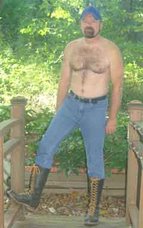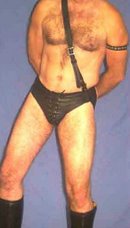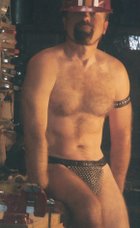

The following is an article from the Bay Area Reporter on the screenwriter who is currently involved in the big screen pic about the life, loves and sad ending of the first modern day gay leader, Harvey Milk.
Castro couch-surfing with 'Milk' screenwriter Dustin Lanceby David Lamble It's late on a sunny Thursday morning in the Castro when a slim and radiantly beautiful young man, someone who would not seem out of place on the set of a Harry Potter movie, climbs the stairs of my Market Street flat, plops himself down on the worn, black couch, and explains why he's spent nearly half his life pursuing a dream to turn the life of a martyred gay politician into a film.
Dustin Lance Black is a polite and focused young man, a multi-talented writer/filmmaker who's spent the decade since college finding a creative platform to exorcise the demons of a complicated childhood spent boomeranging between military installations in the Central Valley and a Texas city that's home to the Alamo and his Mormon parents.
For the last couple of years, Black has been leading a kind of double life: by day, a staff writer for the wickedly funny HBO series Big Love, a witty satire on the cultural baggage shared by Utah's surviving polygamist families and the Church of Jesus Christ of the Latter Day Saints.
Weekends have found Black shooting up I-5, listening to a stack of opera CDs favored by his hero Harvey Milk, on a mission to track down every surviving member of Milk's political clan.For nearly a quarter century, the desire to fashion a fictional template for the slain gay politician's achingly brief career has tempted and ultimately frustrated talents from fabled director Oliver Stone to Milk biographer Randy Shilts.
To Black, the core of the problem has always been to locate the emotional heartbeat of the story, the elusive but vital role Milk has played in the imaginations of generations of queer kids looking for a father figure in the miasma of myth that has grown up around him.
"It was tough. It was clearly, in my mind, a gay movie. I wasn't so interested in the politics, I wasn't so interested in Dan White; I was interested in this man who, to me at least, was a father figure to his people to people who lost their fathers, their parents and their families because of their sexuality. Here was this father figure, and it was something I craved!"
Boy crushChildhood for Lance Black meant growing up in San Antonio, Texas, surrounded by military bases. "I had my first crushes on a boy neighbor when I was like six, seven. I knew what was going on, I knew I liked him, but what Texas did and what the culture of growing up Mormon, growing up military [reinforced], was, the very second thought I had, 'I really like that boy, and it's not just as a friend,' the very second thought was, 'I'm sick, I'm wrong, I'm going to hell. And if I ever admit it, I'll be hurt, and I'll be brought down.'"
It wasn't until college and he was well on his way to fulfilling his dreams that Black discovered an alternative to the mantras of guilt and silence, of duty and obedience promoted by the army and the church. He discovered his father figure; fittingly, for a boy yearning to be a filmmaker, he found him at the movies.
It was in the mid-90s that Black first saw Rob Epstein's Oscar-winning documentary, The Times of Harvey Milk. "When I was in high school, we moved from Texas to Salinas, California. My stepdad had been transferred to Fort Ord. I started getting into theatre and acting, working at The Western Stage down in the Salinas-Monterey area, coming up here for TV auditions, and getting to know, for the first time in my life, out gay men."It was the late 80s, early 90s, it wasn't a hopeful time in San Francisco. The one story of hope you did hear was about Harvey Milk, this one man who accomplished so much in a short period of time, and was really the charismatic leader that people were looking for when I was here.
"In college, when I first saw a copy of the documentary, I remember just breaking down into tears. I thought, 'I just want to do something with this, why hasn't someone done something with this?'"The key to the puzzle, to separating fact from fiction about Milk, lay in a chance introduction to the late supervisor's former aide and disciple Cleve Jones. Jones brought Black into the circle of Milk's political family: photographer Danny Nicoletta, Milk's one-time City Hall assistant and leather-jacketed friend Anne Kronenberg, and members of the Democratic Party machine whose grip on election success frustrated Milk's ambitions.Black admits to suffering from the professional screenwriter's greatest curse: the sprawling script that attempts to cover every possible facet of a hopelessly complex story. "You learn to kill your babies, whole scenes and chapters" must fall out of the script. In effect, "you're killing real people," excising colorful moments in Milk's life involving his eventual successor, Harry Britt; his 1976 race for an a state assembly seat in the Castro (lost to Art Agnos); and much of the vital battle to defeat the anti-gay-schoolteacher ballot initiative sponsored by right-wing state senator John Briggs.
For Black, one of the hardest tasks was not to oversimplify Milk's often tortured emotional journey. He pruned more than a dozen boyfriends down to two indispensable lovers: Scott Smith, perhaps the one true love (played in the film by Indiewood heartthrob James Franco); and one of Harvey's last flames, the mercurial Jack Lira (Mexican filmmaking sensation Diego Luna), the boyfriend who stood arm-in-arm with Milk as the newly elected "Mayor of Castro Street" joined his friends and neighbors in a joyful stroll down Market Street to an outdoor swearing-in ceremony. As Milk once quipped, "Sex entered into it, on the front page of The Examiner, there's Supervisor Harvey Milk with his lover."
Through the travail of draft after draft, as the Milk script was winnowed down to the core beats about the man, Black never forgot the little boy from San Antonio whose Texas childhood shadowed his dreams. "Texas kept me very quiet. I became intensely shy, I had thoughts of suicide. I was a pretty dark kid, because I had an acute awareness of my sexuality, and was absolutely convinced that I was wrong.
In his Hope Speech, Harvey Milk says, 'There's that kid in San Antonio, and he heard tonight that a gay man was elected to public office, and that will give him hope.' And when I first heard that speech, it really did that. It really, really gave me hope, for the first time."
I've been waiting for this big screen adaptation of Harvey Milk's life for a long time.
I hope none of us will be disappointed. Since Harvey's death, there has never been a "national" gay leader to take his place. Maybe this movie will inspire that special person to become a national gay leader and help win the right of LGBT to marry in every state in the Union.
We can only be so hopeful.











2 comments:
I have been in the Bay Area a couple of times in the past few months and have followed their conversion of The Castro back to 1970s era. Changing the store fronts, the signs, the flags and banners. All for the production of this film.
I'm such a bad gay, I'm only faintly familiar with Harvey Milk is. I will, however now go and look him up! ;-) thanks for sharing! ;-) peace
Post a Comment